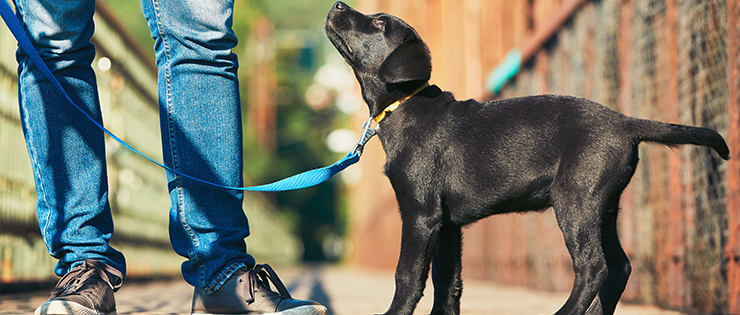
Once you bring your puppy home, training begins. Puppies are like toddlers; absorbing their surroundings like little sponges. Every person they meet, noise they hear and place they smell can end up being remembered for life. That is why the first few months of your dog’s life are so critical and play a huge part in shaping who they grow up to be.
One of the most important parts of your puppy’s routine is establishing an exercise schedule. Previously we believed the best sort of exercise was a half hour walk around the block each day. Whilst any exercise is valuable for a dogs mental and physical health, getting creative with exercise activities are far more beneficial for mind and body.
Dogs are intelligent animals, and puppies need to learn by exploring, so why not incorporate your puppy’s daily exercise routine into fun and educational games? Play and investigative activities not only help to expand your dog’s mind, but they help to foster a lifelong bond between you both. For any new owner, it is imperative they earn the puppy’s trust and respect as soon as possible.
Puppies under 16 weeks of age aren’t completely protected from nasty viruses such as Parvo, so it is no surprise your vet may ask you to keep young Fido home and safe until his final vaccination. However, this doesn’t mean that you can’t expose your puppy to many new experiences through physical and mental exercise, without risking their health and wellbeing. Here are some top tips of mine to get you started:
- Teach your puppy to feel comfortable with a harness and lead. It is best to teach them to tolerate it when they are relaxed and when you have time to reinforce them with food and praise. If they become excitable or begin chewing on the lead, consistently ignore them, until they calm down.
- Practice leash walking in the house and backyard, rewarding your puppy when they are cooperating and walking beside you. Leash walking should be fun, so encourage your puppy to walk alongside you, using treats and praise. If they pull ahead, stop abruptly and lure them back towards you. It is important never to reinforce your puppy’s pulling behaviour, so remember to be consistent in your training.
- Avoid hyperactive exercise before or after food, or water. This can result in bloat or nausea and vomiting. Additionally, avoid exercising your puppy on particularly hot and cold days.
- Avoid running with your puppy until they are at least 12 – 18 months old. What I mean by this is jogging long distances over 2 or 3 km. As puppies physically develop, strenuous exercise can prevent healthy formation of joints, ligaments, muscles and bones.
- Teach your puppy to play fetch. Fetch is a great game that most dogs enjoy, and the best part is you don’t have to leave your backyard. To teach your puppy to play this game, use a ball that is soft and small enough for their mouth (but not too small that they can swallow it or choke).
- Get your puppy engaged in the ball and throw it near them (within arm’s reach of you). Once they pick it up in their mouth, praise them and offer a treat in exchange for the ball back.
- Most puppies will happily give up the ball for a treat. Remember, the best way to reinforce this cooperation is to throw the ball to them again, to continue the game.
- Always finish play on a high and encourage some calm interactions afterwards. If your puppy runs off with the ball, ensure you never chase them! This only reinforces the behaviour and makes it difficult to teach them to bring it back. Simply ignore them completely until they bring it back, or until they give up. This game should be short and sweet. Any excessive exercise can be harmful otherwise.
- Take your puppy in the car and visit a friend who has fully vaccinated and socialised dogs. Remember, it is so important to teach your puppy good social skills when they are very young. Taking them to a friend’s house avoids risk of disease plus it allows your dog to engage in valuable social activity.
- Scent detection is one of my favourite games to play with dogs of all ages. Remember that mental exercise is just as important as physical exercise. Teaching your puppy to identify a scent, locate it and indicate they have found it is a skill that provides both a mental and physical outlet.
Remember, your puppy is new to this world and needs guidance. Do your best to always provide them with a safe environment where they can explore and learn positive behaviours. As your dog’s trusted guardian, you will find that their behaviours are reflective of your leadership. The more you set your dog up for success, the more they will succeed through life.